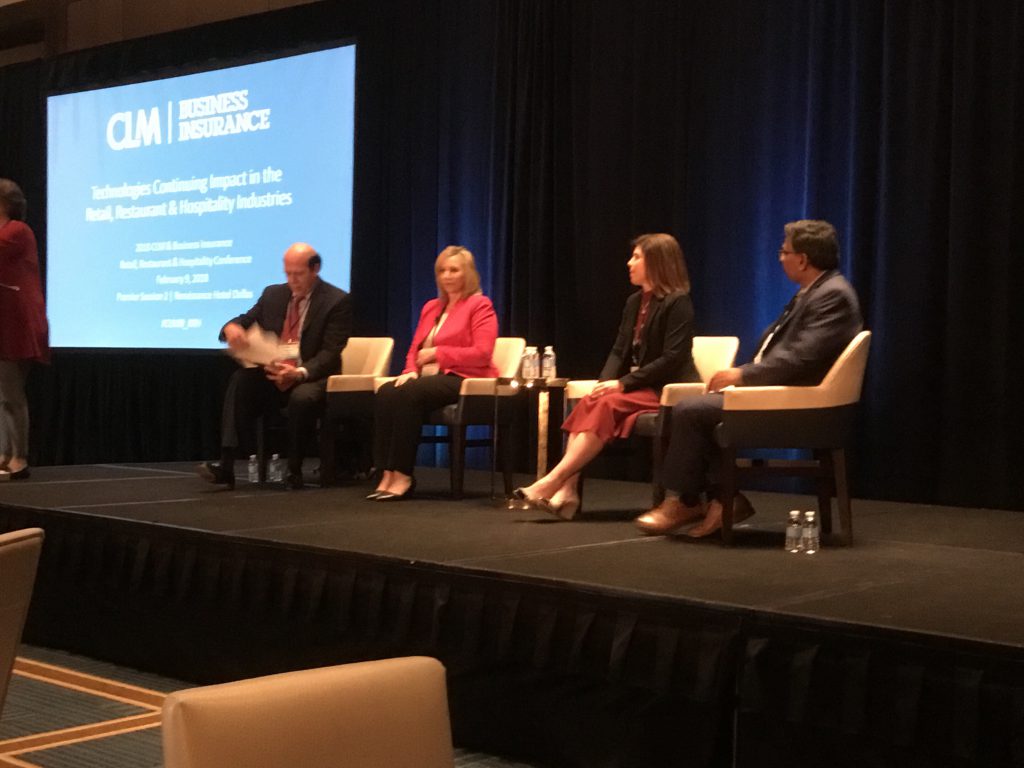Technology’s Impact on the Retail, Restaurant and Hospitality Industries
At the 2018 CLM/Business Insurance Retail, Restaurant and Hospitality Conference, a panel discussed the impact that technology is having on these industries. The panel included:
- Marsha Bonner – Chief Risk and Benefits Officer; RLJ Lodging Trust
- Venkat Kandru – EVP, IT; The Howard Hughes Corporation
- Kim Sanders – Senior Director of Risk Management; Brinker International
- Raymond Zale – Partner in Charge; norASIA Consultancy and Advocacy
Retail Industry
The retail industry is undergoing a sweeping transformation as more and more shoppers are staying out of brick and mortar stores and shopping online. Over 3,400 retail locations closed in 2017 marking the first time that store closings were greater than new store openings.
Social media is an important element in elevating your brand presence, enhancing your marketing and providing an opportunity for engagement with your customers. Traditional retailers are working to link the their digital shoppers with their physical stores.
Hospitality Industry
Technology has changed the way the hospitality industry does business. They are actively competing with new entrants to the industry like Air B&B. Mobile technology allows guests to make reservations, check in, and even obtain their electronic room keys without interaction with hotel staff.
Immediate service is the expectation. Customers can use their app to order food, request extra towels, or report a problem in their room.
Online forums and social media are very important to the hospitality industry as poor customer reviews can spread quickly and impact their business.
There are concerns about how this mobile experience can impact the industry’s ability to disrupt human trafficking. Hotel staff are trained to recognize signs of human trafficking, but with limited interaction with guests this becomes a bigger challenge.
Restaurant Industry
In the last 5-10 years technology has gone from a “nice to have” to a necessity in the restaurant industry. This is a hyper-competitive industry with restaurants competing against each other actively for customers.
Restaurants are using apps to make reservations and they can also allow customers to check in and hold their place in line. Apps can also be used to order food for take out. Some restaurants have seen a significant uptick in their take out business since implementing ordering apps.
Tabletop devices allow customers to order dessert or pay their bill when they are ready. The tabletop devices also allow the guest to provide feedback on their experience. They are seeing a significant increase in customer feedback received because of these devices, which enables them to continue to enhance their customer experience.
On the downside, there is an increase in negative feedback that is broadcasted across social media networks. One bad experience captured on film can quickly spread around the country causing significant damage to the reputation of their business. The ability to spread negative information via social media is impacting the way they approach customer claims.
Credit card transactions
Technology has transformed credit card transactions reducing the risk of customer credit cards being stolen. Credit card information is no longer stored on vendor equipment and instead the transaction is instantaneous and the risk to the vendor of having that information on their system is eliminated. Customers don’t even have to use their credit card and can pay with apps such as Apple Pay.
Maintaining balance
One of the struggles with technology is maintaining the appropriate balance of customer service with customer convenience. The hotel or restaurant won’t know there is a special occasion where they would have the opportunity to enhance the customer experience because they don’t have that interaction. People want convenience, but they also expect service.
Lessons learned
- Technology can not fully replace people because people still like that social experience.
- Technology allows vendors to provide an enhanced guest experience.
- Risk management has a continuous role to review the implications and understand how to mitigate the risks associated with technology changes.


